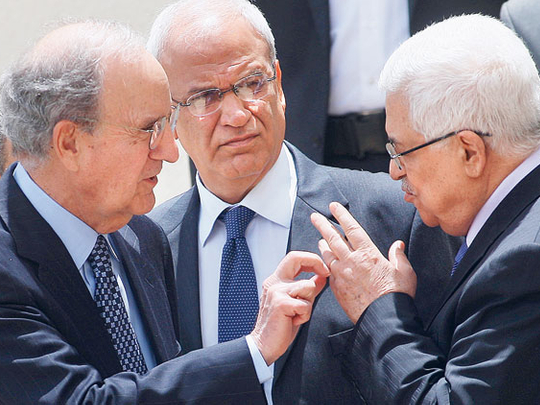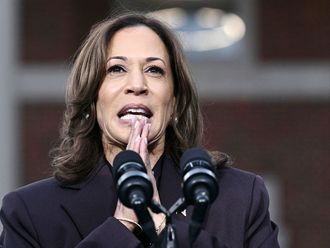
London: British intelligence helped draw up a secret plan for a wide-ranging crackdown on the Islamist movement Hamas which became a security blueprint for the Palestinian National Authority, leaked documents reveal.
The plan asked for the internment of leaders and activists, the closure of radio stations and the replacement of imams in mosques.
The disclosure of the British plan, drawn up by the intelligence service in conjunction with Whitehall officials in 2004, and passed by a occupied Jerusalem-based MI6 officer to the senior PNA security official at the time, Jibril Rajoub, is contained in the cache of confidential documents obtained by Al Jazeera TV and shared with the Guardian. The documents also highlight the intimate level of military and security cooperation between Palestinian and Israeli forces.
The bulk of the British plan has since been carried out by the West Bank-based PNA security apparatus which is increasingly criticised for authoritarian rule and human rights abuses, including detention without trial and torture.
The British documents, which have been independently authenticated by the Guardian, included detailed proposals for a security taskforce based on the UK's "trusted" Palestinian National Authority contacts, outside the control of "traditional security chiefs", with "direct lines" to Israel intelligence.
It lists suicide bombers and rockets as issues that need urgent attention.
Under the heading "Degrading the capabilities of the rejectionists", the MI6 Palestinian Security Plan recommends "the detention of key middle-ranking officers" of Hamas and other armed groups, adding: "We could also explore the temporary internment of leading Hamas and PIJ [Palestinian Islamic Jihad] figures, making sure they are well-treated, with EU funding."
The latest leaks come as US state department spokesman Philip Crowley said they would "at least for a time, make the situation more difficult", while the senior Palestinian negotiator Nabil Sha'ath acknowledged that the documents were genuine and Palestinian groups in Latin America reacted with shock to the revelation that former US secretary of state Condoleezza Rice had privately suggested Palestinian refugees be settled in Chile or Argentina.
Among the newly released confidential PNA documents is an extraordinary account of a 2005 meeting between Israel's then defence minister, Shaul Mofaz, and the PNA's interior minister, Nasser Yousuf.
Referring to Hassan Al Madhoun, a commander in the armed Fatah-linked Al Aqsa Martyrs' Brigades who was held responsible by Israel for a suicide attack the previous year, Mofaz asked Yousef: "We know his address ... Why don't you kill him?" Yousef replied: "The environment is not easy, our capabilities are limited." Israel killed Madhoun a few months later in a drone missile attack on his car.
The PLO's chief spokesman, Saeb Erekat, is recorded as telling senior US official David Hale in 2009: "We have had to kill Palestinians to establish one authority, one gun and the rule of law. We have even killed our own people to maintain order and the rule of law."
Erekat also complained to US envoy George Mitchell in 2009 that not enough was being done to seal off tunnels from Egypt into the Gaza Strip, the documents reveal, undermining the siege of the Hamas-controlled territory, and urged that more be done by Israel and Egypt to prevent the smuggling of goods and weapons. In an echo of the proposals in the British documents, Erekat told Hale: "We are not a country yet but we are the only ones in the Arab world who control the zakat [religious charitable donations] and the sermons in the mosque."
The intelligence papers highlight the far-reaching official British involvement in building up the Palestinian National Authority's security apparatus in the West Bank, which was led from the late 1990s by the CIA and recently has focused on the build-up of forces under General Keith Dayton, who was US security coordinator for Israel and the Palestinian territories until last October.
Alistair Crooke, a former MI6 officer who also worked for the EU in Israel and the Palestinian territories, said that the British documents reflected a 2003 decision by Tony Blair to tie UK and EU security policy in the West Bank and Gaza to a US-led "counter-insurgency surge" against Hamas which backfired when the Islamists won the Palestinian elections in 2006.
The PNA's security control of the West Bank has become harsher and more extensive since the takeover of Gaza by Hamas in the summer of 2007. Hundreds of Hamas and other activists have been routinely detained without trial in recent years, and subjected to widely documented human rights abuses. In a meeting with Palestinian officials in 2009, Dayton is recorded praising the PNA's security: "The intelligence guys are good. The Israelis like them. But they are causing some problems for international donors because they are torturing people.
"I've only started working on this very recently. I don't need to tell you who was working with them before," in an apparent reference to the CIA.












